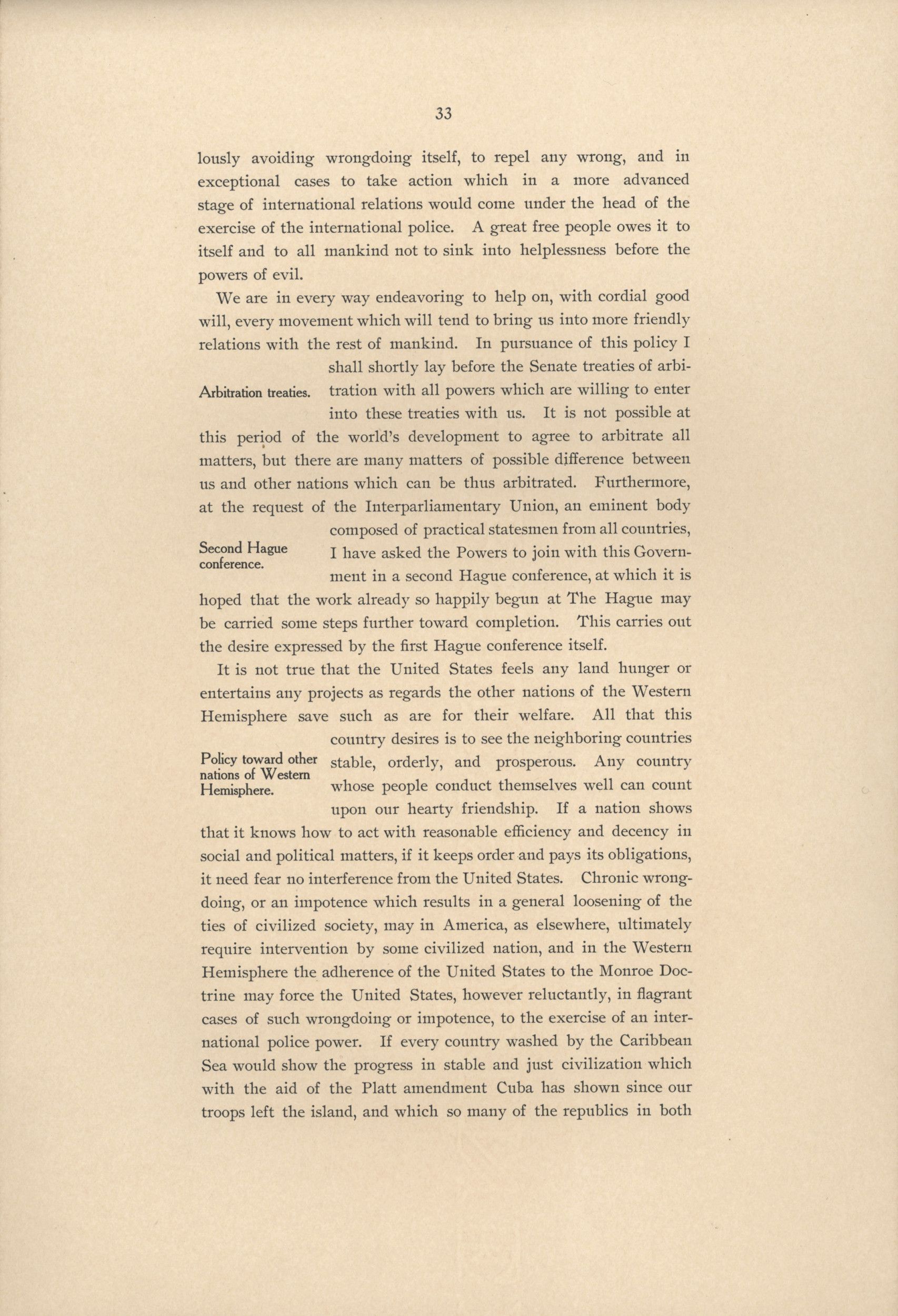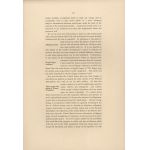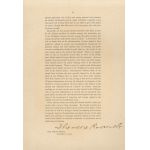The Roosevelt Corollary
1904
Add to Favorites:
Add all page(s) of this document to activity:

Add only page 1 to activity:
Add only page 2 to activity:
In his annual messages to Congress in 1904 and 1905, President Theodore Roosevelt expanded the Monroe Doctrine. The corollary stated that not only were the nations of the Western Hemisphere not open to colonization by European powers, but that the United States had the responsibility to preserve order and protect life and property in those countries.
European intervention in Latin America had resurfaced as an issue in U.S. foreign policy when European governments began to use force to pressure several Latin American countries to repay their debts. For example, British, German, and Italian gunboats blockaded Venezuela’s ports in 1902 when the Venezuelan government defaulted on its debts to foreign bondholders. Many Americans worried that European intervention in Latin America would undermine their country’s traditional dominance in the region.
To keep other powers out and ensure financial solvency, President Theodore Roosevelt issued his corollary. "Chronic wrongdoing...may in America, as elsewhere, ultimately require intervention by some civilized nation," he announced in his annual message to Congress in December 1904, "and in the Western Hemisphere the adherence of the United States to the Monroe Doctrine may force the United States, however reluctantly, in flagrant cases of such wrongdoing or impotence, to the exercise of an international police power."
Roosevelt tied his policy to the Monroe Doctrine, and it was also consistent with his foreign policy of "walk softly, but carry a big stick." Roosevelt stated that in keeping with the Monroe Doctrine, the United States was justified in exercising "international police power" to put an end to chronic unrest or wrongdoing in the Western Hemisphere.
This so-called Roosevelt Corollary—a corollary is an extension of a previous idea—to the Monroe Doctrine contained a great irony. The Monroe Doctrine had been sought to prevent European intervention in the Western Hemisphere, but now the Roosevelt Corollary justified American intervention throughout the Western Hemisphere. In 1934, Franklin D. Roosevelt renounced interventionism and established his Good Neighbor policy within the Western Hemisphere.
European intervention in Latin America had resurfaced as an issue in U.S. foreign policy when European governments began to use force to pressure several Latin American countries to repay their debts. For example, British, German, and Italian gunboats blockaded Venezuela’s ports in 1902 when the Venezuelan government defaulted on its debts to foreign bondholders. Many Americans worried that European intervention in Latin America would undermine their country’s traditional dominance in the region.
To keep other powers out and ensure financial solvency, President Theodore Roosevelt issued his corollary. "Chronic wrongdoing...may in America, as elsewhere, ultimately require intervention by some civilized nation," he announced in his annual message to Congress in December 1904, "and in the Western Hemisphere the adherence of the United States to the Monroe Doctrine may force the United States, however reluctantly, in flagrant cases of such wrongdoing or impotence, to the exercise of an international police power."
Roosevelt tied his policy to the Monroe Doctrine, and it was also consistent with his foreign policy of "walk softly, but carry a big stick." Roosevelt stated that in keeping with the Monroe Doctrine, the United States was justified in exercising "international police power" to put an end to chronic unrest or wrongdoing in the Western Hemisphere.
This so-called Roosevelt Corollary—a corollary is an extension of a previous idea—to the Monroe Doctrine contained a great irony. The Monroe Doctrine had been sought to prevent European intervention in the Western Hemisphere, but now the Roosevelt Corollary justified American intervention throughout the Western Hemisphere. In 1934, Franklin D. Roosevelt renounced interventionism and established his Good Neighbor policy within the Western Hemisphere.
Transcript
33-lously avoiding wrongdoing itself, to repel any wrong, and in exceptional cases to take action which in a more advanced stage of international relations would come under the head of the exercise of the international police. A great free people owes it to itself and to all mankind not to sink into helplessness before the powers of evil.
We are in every way endeavoring to help on, with cordial good will, every movement which will tend to bring us into more friendly relations with the rest of mankind. In pursuance of this policy I shall shortly lay before the Senate treaties of arbitration with all powers which are willing to enter into these treaties with us. It is not possible at this period of the world’s development to agree to arbitrate all matters, but there are many matters of possible difference between us and other nations which can be thus arbitrated. Furthermore, at the request of the Interparliamentary Union, an eminent body composed of practical statesmen from all countries, I have asked the Powers to join with this Government in a second Hague conference, at which it is hoped that the work already so happily begun at The Hague may be carried some steps further toward completion. This carries out the desire expressed by the first Hague conference itself.
It is not true that the United States feels any land hunger or entertains any projects as regards the other nations of the Western Hemisphere save such as are for their welfare. All that this country desires is to see the neighboring countries stable, orderly, and prosperous. Any country whose people conduct themselves well can count upon our hearty friendship. If a nation shows that it knows how to act with reasonable efficiency and decency in social and political matters, if it keeps order and pays its obligations, it need fear no interference from the United States. Chronic wrongdoing, or an impotence which results in a general loosening of the ties of civilized society, may in America, as elsewhere, ultimately require intervention by some civilized nation, and in the Western Hemisphere the adherence of the United States to the Monroe Doctrine may force the United States, however reluctantly, in flagrant cases of such wrongdoing or impotence, to the exercise of an international police power. If every country washed by the Caribbean Sea would show the progress in stable and just civilization which with the aid of the Platt Amendment Cuba has shown since our troops left the island, and which so many of the republics in both
[pages ommitted]
40
against oppress, and if their real wants, material and spiritual, are studied intelligently and in a spirit of friendly sympathy, much more good will be done them than by any effort to give them political power, through this effort may in its own proper time and place be proper enough.
Meanwhile our own people should remember that there is need for the highest standard of conduct among the Americans sent to the Philippine Islands, not only among the public servants but among the private individuals who go with them. It is because I feel this so deeply that in the administration of these islands I ahve positively refused to permit and discrimination whatsoever for political reasons and have insisted that in choosing the public servants consideration should be paid solely to the worth of the men chosen and to the needs of the islands. There is no higher body of men in our public service than we have in the Philippine Islands under Governor Wright and his associates. So far as possible these men should be given a free hand, and their suggestions should receive the hearty backing both of the Executive and of the Congress. There is need of a vigilant and disinterested support of our public sercants in the Philippines by good citizens here in the United States. Unfortunately hitherto those of our people here at home who have specially claimed to be the champions of the Filipinos have in reality been their worst enemies. This will continue to the be the case as long as they strive to make the Filipinos independent, and stop all industrial development of the islands by crying out against the laws which would bring it on the ground that capitalists must not "exploit" the islands. Such proceedings are not only unwise, but are most harmful to the Filipinos, who do not need indepences at all, but who do need good laws, good public servants, and the industrial development that can only come if the investment of American and foreign capital in the islands is favored in all legitimate ways.
Every measure taken concerning the islands should be take primarily with a view to their advantage. We should certainly give them lower tariff rates on their exports to the United States; if this is not done it will be a wrong to extend our shipping laws to them. I earnestly hope for the immediate enactment into law of the legislation now pending to encourage American capital to seek investment in the islands in railroads, in factories, in plantations, and in lubering and mining.
Theodore Roosevelt
The White House
December 6, 1904.
against oppress, and if their real wants, material and spiritual, are studied intelligently and in a spirit of friendly sympathy, much more good will be done them than by any effort to give them political power, through this effort may in its own proper time and place be proper enough.
Meanwhile our own people should remember that there is need for the highest standard of conduct among the Americans sent to the Philippine Islands, not only among the public servants but among the private individuals who go with them. It is because I feel this so deeply that in the administration of these islands I ahve positively refused to permit and discrimination whatsoever for political reasons and have insisted that in choosing the public servants consideration should be paid solely to the worth of the men chosen and to the needs of the islands. There is no higher body of men in our public service than we have in the Philippine Islands under Governor Wright and his associates. So far as possible these men should be given a free hand, and their suggestions should receive the hearty backing both of the Executive and of the Congress. There is need of a vigilant and disinterested support of our public sercants in the Philippines by good citizens here in the United States. Unfortunately hitherto those of our people here at home who have specially claimed to be the champions of the Filipinos have in reality been their worst enemies. This will continue to the be the case as long as they strive to make the Filipinos independent, and stop all industrial development of the islands by crying out against the laws which would bring it on the ground that capitalists must not "exploit" the islands. Such proceedings are not only unwise, but are most harmful to the Filipinos, who do not need indepences at all, but who do need good laws, good public servants, and the industrial development that can only come if the investment of American and foreign capital in the islands is favored in all legitimate ways.
Every measure taken concerning the islands should be take primarily with a view to their advantage. We should certainly give them lower tariff rates on their exports to the United States; if this is not done it will be a wrong to extend our shipping laws to them. I earnestly hope for the immediate enactment into law of the legislation now pending to encourage American capital to seek investment in the islands in railroads, in factories, in plantations, and in lubering and mining.
Theodore Roosevelt
The White House
December 6, 1904.
This primary source comes from the Records of the U.S. House of Representatives.
National Archives Identifier: 5752367
Full Citation: Theodore Roosevelt's Annual Message for 1904; 1904; Presidential Messages, 1791 - 1861; Records of the U.S. House of Representatives, Record Group 233; National Archives Building, Washington, DC. [Online Version, https://docsteach.org/documents/document/roosevelt-corollary-monroe-doctrine, April 23, 2024]Rights: Public Domain, Free of Known Copyright Restrictions. Learn more on our privacy and legal page.





